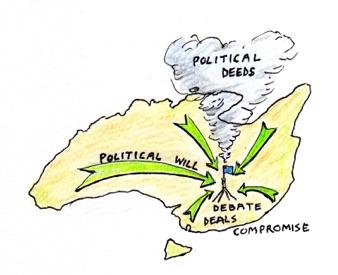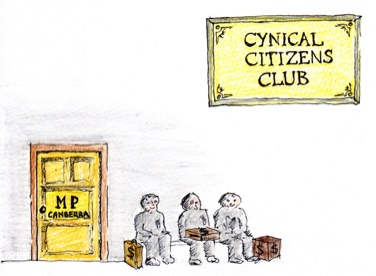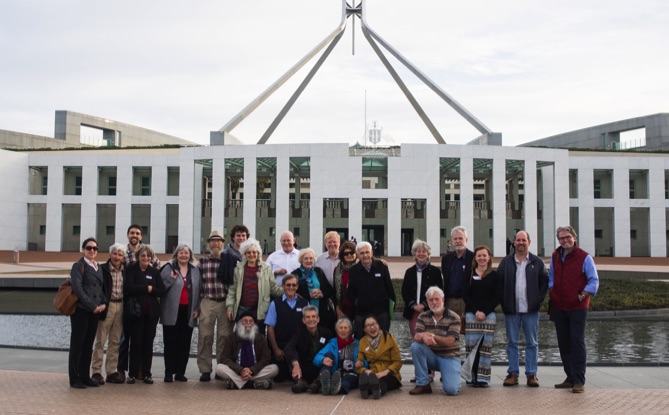CITIZEN ENGAGEMENT & climate policy

It is. As soon as we understood the planetary diagnosis with a degree of certainty - which we did during the last 20 or 30 years - everyone in a position to know acquired a responsibility toward the people of the future ... to either seek the best remedy available, or to condemn our descendants in favour of our own present comfort. Choosing not to know is a way of dodging this. But if most politicians, the people with the levers of power in their hands, are choosing not to know, or kidding themselves they're doing more than they really are, what are we to do - folks like us who give a damn about their grandkids, and can see a way to help them?
When you think about it like this, you can see that political will isn't something that arises in parliaments because politicians get worried about something - not when it's a problem as huge and scary as this one. No. We have to create it ourselves - we, the grandparents, the young people, the engaged scientists, the people with the most to lose. We have to make sure our representatives understand so they can do what they promised to do ... represent us, the owners of our democracy in the place where laws get made.

Modern democracy was invented in the United States 200 years ago. Back then, it was taken for granted that citizens would be constantly telling their representatives what they wanted to happen. The assembly members would then be able to use a combination of the expertise available to law-makers, capable judgement forged out of their experience, and a close knowledge of their communities, as they attempted to make sound public policy. Today, they only hear about us from opinion polls; and while we're not talking to them, they hear plenty from professional lobbyists and their party enforcers. Our citizenship is hibernating ... but we can revive it any time we want.

Sam discovered that if you approach politicians as allies rather than opponents; if you clearly convey your confidence that they will act responsibly once they become convinced of what responsibility entails; and if you give them well warranted advice about what we need to do, most of them are very anxious to do the right thing. In other words, our endemic distrust of politicians is to this extent misplaced - it turns out that citizens have duties too, neglect of which induces pathology in the machinery of a free society. If politicians are not solidly, regularly and soundly informed by their constituents, they are in no position to well-represent them. Our cynicism is at least partly unjust - some of it belongs to ourselves.
What explains our ability to separate what we know from what we believe, to put aside the things that seem too painful to accept? How is it possible, when presented with overwhelming evidence, even the evidence of our own eyes, that we can deliberately ignore something - while being entirely aware that this is what we are doing? George Marshall, 2014
Anyone who's thought about the climate problem knows there is something very strange about our society's response to it. All over the world, people know that humans have caused something very big and that we should be fixing it now. At the same time, collectively, we are behaving exactly as if we didn't know any such thing. There's something about this bit of news that makes us want to turn away; and if we are forced to look, it makes us deeply uncomfortable.
And our public policy is a mess. It's not because people don't care about their grandchildren. It's not because we are trapped in narrow ideological camps. No, it's because we find stories that let us off the hook ... warming is natural; environmentalists exaggerate; carbon dioxide doesn't hurt; it's cooling; trying to fix it will make us poor; it's the Chinese ... etc, etc. The strange thing is that these trump the stories told us by our planetary diagnosticians, the geophysical scientists who've been working on the problem for years.
Do we do this because the climate problem is scary? Or because it's not scary enough? Or because there are people stirring up doubt and confusion for their own reasons? Could it be true, as we sometimes confess in dark moments, that humans, the clever species, are just too selfish to care enough about future people? Could we, through deficient foresight or some other fault, behave like lemmings, instead of like people?
These are very searching and important questions, thrust on us now by the urgency of our predicament, but so far unanswered. I'm going to propose a provisional answer - something to use until we discover a better one. It's this: we are scared - but not unreasonably; this is a deeply disturbing thing, and wanting to look away is perfectly normal. And in one sense, we're not scared enough - mainly because with so many conflicting messages around we can easily find a story to cover our discomfort. And yes, we can be selfish - but we can be generous too; and whether we are mean, or blind, or tenacious or noble, is really due to choices we make. It's up to us.
If you take this view, complaining about our politicians and giving up on our fellow humans are not rational judgements. They're a kind of cop-out. Cynical detachment is never really indifferent, because judgements are never merely rational. A few moments' reflection confirms this. How can we accede to the reckless self-destruction of our society without at the same time abandoning our immediate descendants - our grandchildren, and theirs? We can't. A shrug is easy, but it absolutely entails something impossible - as long as we grant that the climate problem is a moral one.
* We can quit. Write a note to future people explaining how the system failed. Too bad.
* Jump up & down. Protests are effective & many civil society groups are getting them to work right now ... but opposition has limits. It begets reaction, and so progress by this route alone is slower than we want.
* Let everyone do their bit. Millions of adjustments to our wasteful lives will make a difference - and they re necessary - but they won't ever be enough. Virtuous behaviour makes us feel good, but changing the economic system (which must happen) means collective action, and that means political will.
* We can make political will.
How do we do that? You might well ask. Isn't politics done in the capital by arcane procedures closed to outsiders? Hasn't politics been sold to businessmen and lobbyists and media moguls? Aren't politicians hopelessly out of touch and unreachable? Isn't the public too cynical and detached to interfere?
Well, yes to all of the above ... but wait a moment. Isn't it still the case that people own democracies? That hasn't been changed by money in politics, has it? Unless we really think all politicians are venally corrupt (and that's clearly not the case, no matter what we think of their performance as wise stewards) then it must still be true that they enter the game with some intention to serve capably - and we can afford to believe that, given a chance that's what they will do. Just because they find they have to operate in a dysfunctional system doesn't mean they can't be representatives of our declared and genuine best interest.
*****
It's certainly true that citizens and their representatives have drifted apart. Once, and not all that long ago, connections between elected representatives and their constituencies were full of life. Public debates were vigorous and inclusive, meetings frequent, exchanges conducted in many places. No one thought their one and only chance to be a political actor came around every three or four years on election day. Now though, the people we elect are on their own. We choose them and then pretty much forget them. Ask any politician and they'll tell you the same - almost the only thing they hear from electors for three years is about administrative gripes.
And if we want law-makers to get serious about the climate problem, that is what we must do. First they need to understand what we're up against, then they need to know what we can do about it. Right now very few of them know these things. And if they don't know, they can't make decent decisions.
It's not that most politicians actively deny the problem - they just need to be much better informed.
Serious denial of the climate problem is not so common - roughly one person in six apparently believes the whole thing is a kind of hoax. That's plenty, for such a foolish conviction, but it isn't enough to steer public policy by itself. And the number of outright denier politicians is probably about the same. Much more common is the feeling that there's a problem, but maybe it's not so bad; or we're not sure; or it's too hard. This is what George Marshall was thinking of ... knowing, and not knowing. In politics what it looks like is lots and lots of talking; and timid decisions that won't fix the problem, but still allow politicians to say they re doing what s possible ... as long as no one looks too hard.
Guy Pearce called this greenwash - all sorts of ways of pretending we're doing something; all the while refusing to acknowledge the planetary diagnosis for what it is - a true emergency of gigantic proportions.
We ought to admit that politicians are in a tricky position. First, they need to keep their jobs. If they tell us we need certain things that will cost us something and might diminish our ease and comfort - and they also upset powerful business interests - then other people with more popular messages will replace them. If they tell us only what we want to hear, and don't rock the boat, they stay in office and can always tell us and themselves they did everything the system permitted them. Too bad it wasn't a better system.
And they must do everything to see that this global problem isn't stranded on the shoals of national interests, or regional prejudice. If there is anything since the coming of peace in 1945 that is an irresistible imperative for internationalism, it is surely this. The problem will be quite simply insoluble unless we act as a human family. That doesn't mean relinquishing identities, and it doesn't mean homogenising cultures. It means much deeper and wider cooperation than we ve been used to.
How do we do it? In a nutshell, the answer is to build sturdy bridges between citizens and their representatives. In societies without representative government, citizens have to protest - and it can be risky and very hard work - but in the fortunate West, the citizens of liberal states have another option. They can become the informers and advisors to their elected officials. Citizens and law-makers approach one another in a spirit of respect and trust. Their job is to define the threat posed by the climate problem as an operational matter - one who's remedy arises straight from its accurate diagnosis. That is perfectly feasible in our present state of knowledge, and is only prevented by our ambivalence. Politicians can understand this.
An organization has grown up in the United States in the last few years to do exactly this ... help citizens turn themselves into effective advocates, and in so doing, "reclaim our democracy", as Sam Daley-Harris put it. Sam saw that the alienation of citizens and their elected representatives was a deep problem for democracies. The space opened up between them didn't stay empty. It has been invaded by agents who were never supposed to be there - corporations, media owners, wealthy lobbyists, campaign donors, and many related civil society entities like think-tanks and institutes with narrow self-interested agendas.
Citizens Climate Lobby, which grew out of Sam's work, is founded on this insight ... if we want to fix the climate problem, three things must happen:
* There must be a clear diagnosis, and it must be clearly understood as a piece of public knowledge, in the same way as the threat of an epidemic or a hurricane. We must have a sense of what might be lost if the problem is unmanaged, and what a remedy would cost.
* Citizens must see to it that their representatives are properly informed both in respect of the hazard, and the options available to executives.
* Law makers and administrators need civil society allies in order to direct a public conversation about necessary actions.
CCL was designed explicitly to work for these three goals. It offers citizens an opportunity to be again what the founders of modern democracies always imagined they would be - active and creative participants in the ownership of their government. It affirms something supremely important for free peoples - that we have it in us to cooperate, and figure out how to solve complex challenges, without necessarily handing over this work to elite or partisan folks who will usually be only too eager for our donation.
But this is just one of a large number of citizens' organizations arising now as the challenge of responding to the climate problem becomes ever more urgent. They all share the conviction that the immense ecological consequences of human economic activity cannot possibly be resolved by professional politicians alone. The political and economic systems are far too deeply entangled for that. Let's not kid ourselves - the entanglement includes us all - each and every economic actor from the biggest corporation to the humblest consumer. So if it's possible to find a solution, it must involve an agreement by everyone that the features of a global economy that have caused this problem have to be changed; that our economic ambitions and behaviour must change accordingly; and that painful economic adjustment now is warranted by the claims of future people.
In my view, the most useful thing any concerned citizen can do is to find a congenial group, and begin exercising the latent power of their citizenship. Always remember that as long as we have a democracy, citizens are sovereign. If enough of them want something enough, it must happen.


